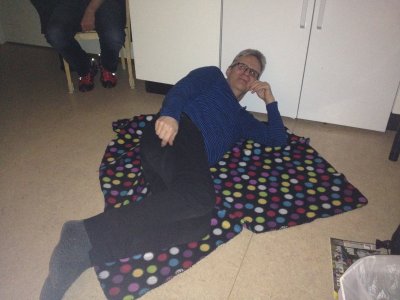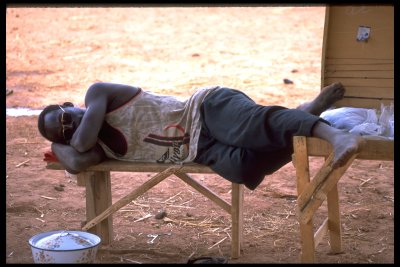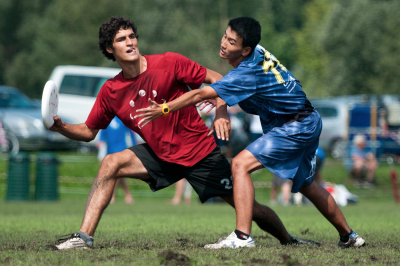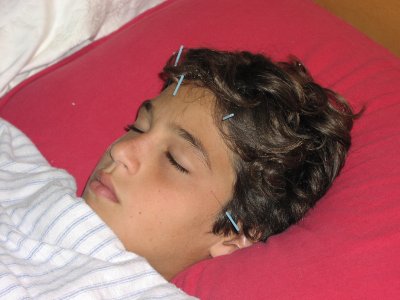Better Posture, Better Sleep
I’ve had lying on my mind lately. I mean flat out, horizontal, no holds barred, delicious, snooze-inducing lying down. It’s not talked about much in the debate whether we should sit, stand, or treadmill our way to better lives. But I say, hey, lying is where it’s at when you are tired, when you need a break, when you need a rest.
My son Nathan knows this quite well. When he Skypes with us, he is usually in his bed, covers pulled up high, computer set on the covers. He works lying, surfs lying, thinks about algorithms lying down.

Nathan Skyping from his bed in Atlanta.
And just as I was thinking he was an outlier, I hear from my Sami friend Fredrik Prost (see previous post) that the Sami like to lie down a lot. “It feels natural” he says “when you are in a tepee” (their traditional mode of habitation), “but we do it in people’s kitchens too.” Here are two photos he sent me of his brothers lying in modern settings.

Fredrik’s brother socializing in the traditional Sami side-lying position.

Another of Fredrik’s brothers has found an even cozier position
- he’s in good company
It’s most common for the Sami to lie on the side, face perched on a hand or fist. Notice that both brothers have their shoulders, hips and ankles aligned, as in side-stretchlying (score, Gokhale Method!)
Much of the (truly civilized) world recognizes the value of the siesta, or afternoon nap. How delicious to wake up refreshed and ready for another round of the hurly burly that is life.

My friend Kouka taking a nap with her niece in Burkina Faso.
We I’ve mentioned the idea of lying breaks and horizontal socializing, the universal response has been “how do you avoid falling asleep?!” Oy! Maybe that’s just what needs to happen! As we hurl ourselves through ever-accelerating lifestyles, a little sleep punctuation may provide an even better interlude than the gym breaks we sometimes guilt-trip ourselves into. Rest is profoundly missing in our lives as increasing numbers of people suffer insomnia, sleep apnea, restless leg syndrome, and, more generally, restless mind syndrome. In my experience, restlessness begets restlessness - it’s helpful to break the cycle of sleep deprivation and rest deprivation. My friend and celebrated sleep expert William Dement, certainly agrees. It has become his one-man mission to get people to sleep more. He teaches that sleep deprivation is at the root of many evils ranging from depression to automobile accidents. And here I would like to join forces with him - if lying down induces you to sleep, that’s evidence you are running a sleep deficit, and it’s never too soon to catch up on it.
But I suspect the benefits of a nap or stretchlying respite go beyond catching up on sleep. I suspect that our nuts and bolts can use the break as well. Gravity is a formidable force. We’ve evolved to handle it well (better than we give ourselves credit for), but we’ve napped to break our vertical stances, if we are to judge from people living in indigenous cultures and traditional societies.

Taking a healthful mid-day nap - it can happen any place
at any time if you are able to improvise. Burkina Faso.
Perhaps those naps are part of the design of what it mean to be human. Perhaps the systematic weeding out of rest and repose from modern lifestyles is part of the reason we are literally breaking apart.
My son Nathan is 6’5” - most furniture doesn’t fit him well. I used to think that was why he needed to lie more than most. Another theory I had was that his enormous expenditure of energy playing Ultimate frisbee at a high level requires him to compensate by lying down unusually much.

Nathan playing Ultimate frisbee, a sport that requires
enormous exertion.Does this lead him to lie down more than average?
Or did I prime him in his childhood with acupuncture “resets” so he is conditioned to associate lying down with deep relaxation?

Nathan receiving an acupuncture treatment from me when
he was a child. Perhaps this strengthened his association
between lying down and relaxation?
Mostly, I’m thinking the young man has some primal wisdom intact - and I’ve decided to try his habit on for size.
I’ve moved a couch over to the side of the room and replaced it with a mat, some bolsters and pillows. I’m still warming up to the novelty of just lying down to chat with company - I might need to replace Brian's couch with a mat too to make it work. So far he has resisted - he likes to perch and think of theorems on the couch. He does like how the living room has opened up... we’ll see how this develops and I’ll keep you posted.

Our current living room arrangement - a work in progress...
I’d love to hear about your ideas and/or adventures in lying down. Pray tell!
Join us in an upcoming Free Workshop (online or in person).
Find a Foundations Course in your area to get the full training on the Gokhale Method!
We also offer in person or online Initial Consultations with any of our qualified Gokhale Method teachers.

Comments
This is a very familiar sight
This is a very familiar sight in our living room, my husband is 6 foot 4 and doesn't fit our furniture that well, he lies just the way you depict. He does take up a good part of the middle of the room, with a scattering of magazines and books within reach. I've sometimes thought we should get rid of some of the excess furniture! The coffee table has to go to the side of the room, which used to bug me 20 years ago, but now I mostly forget we don't have the standard room layout.
One detail in the picture
See our "coffee table" in the picture? It's a trampoline! Really easy to move around. Elsewhere in the room we also have our ping pong table - so our living room has no chance whatsoever of qualifying as having a standard room layout. Isn't the freedom wonderful?
My preferred position when
My preferred position when not standing or moving around is lying down. I find sitting on the couch or in a chair to be very uncomfortable. So, I tend to lie on the couch or in bed like your son. However, it's given me a lot of neck pain as a result since I'm slightly propped up to read or work on the computer. Any suggestions on how to alleviate that?
When I see one of my family
When I see one of my family reclining on a couch, I usually end up adding pillows here and there to smooth out the transition between the seat cushions and the armrests. If that's not the issue, try bringing the computer in register with your head rather than your head in register with the computer. Try propping it up on a lap desk or just a pillow or two. And let your eyes do their full complement of work as well - eyes can cover a bgger range than most of us use them for!
When I need an idea or to
When I need an idea or to solve a problem I lie down or go for a walk. Lying down is usually gets quicker results.
Add New Comment
Login to add commment
Login